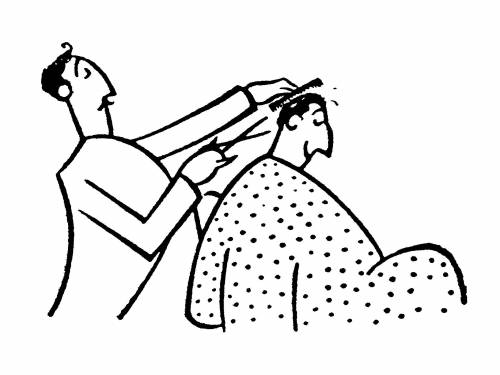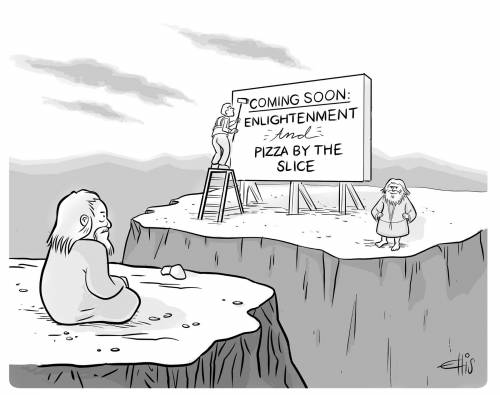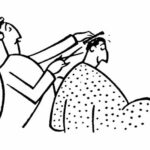On a wintry weekday morning, the actor John Lithgow stopped by Roosevelt Barber Shop, on the Upper West Side, for a hot-towel shave. The barber, who introduced himself as Ralph, peered at his customer. “I think I know you. TV?” he asked. He pointed outside, to where Lithgow’s driver waited, and said, “Somebody in the car? It’s a no-parking zone. No mercy on this side!”

Lithgow was wearing a beret and a long overcoat. He hung these on a rack and sat down in one of the shop’s two chairs. There were mirrors on all sides. Ralph was wearing jeans, a down vest, and a beanie on top of a yarmulke. He grew up in the former Soviet Union, and spoke with an accent. “Well, all right,” he said. He lowered the back of the chair until Lithgow was almost horizontal: “So, one, two, three—I give you sleep time.”
“Here we go!” Lithgow said.
When Lithgow first encountered Ring Lardner’s short story “Haircut,” about a small-town barber, he was a towheaded eight-year-old listening to his father read aloud from an anthology edited by W. Somerset Maugham. Years later, toward the end of his father’s life, Lithgow picked up the same volume and returned the favor. (“A nasty little story by a gin-swilling cynic,” he calls it.) These days, he tells the tale of his father and “Haircut” in a one-man show, “Stories by Heart,” which he’s been touring around the country for a decade, and which recently opened on Broadway.
The Lardner story, which Lithgow recites in its entirety, is narrated by a gossipy neighborhood barber, as he attends to a (silent, presumably horrified) customer. Lithgow performs the piece without props, but he adds ingenious sound effects, which he makes with his mouth: click, whoosh, swish, whish.
“I didn’t used to make sounds—they just gradually crept in,” he said, stretched out in the chair. “There are about five different distinct sounds I make, and many very distinct movements. Like what Ralph just did, cranking my seat back.”
Ralph was at the sink behind Lithgow’s chair. On the wall was a print of an old-timey barbershop and a framed News article about a squirrel that eats pizza.
Lithgow described how he’d put the bit together: “I went off looking for an old-time barber in Los Angeles, so that he could tell me all the details of an—” Ralph dropped a hot towel onto his face, and Lithgow’s voice grew muffled. “Intermission,” he mumbled.
Ralph applied shaving cream and started to make short, silent strokes with a straight razor. A fan rattled; outside, a bus pulled away from the curb.
“Here’s an interesting fact,” Lithgow began, as Ralph rinsed his blade.
“No, you don’t say nothing,” Ralph said. “I’m working.”
With Ralph still at the sink, Lithgow continued, “I found a barber in L.A., and who do you suppose recommended him? Larry Gelbart!” Ralph returned, and Lithgow closed his mouth.
“I do this, you know what, since I’m seventeen. Twenty-five years I’m here,” Ralph said. “The old owner, he was here over forty years. Tony Bennett, the old owner was taking care of him.”
“Tony Bennett came here?” Lithgow asked.

“I have a couple of stars,” Ralph said. “Bruce Willis.”
Talk turned to Ralph’s apprenticeship, in Tashkent, Uzbekistan. “Three months I was standing around my barber, my teacher, and he says, ‘O.K, a customer. Go put a cape on him but do nothing else.’ I said, ‘Come on! Even a crewcut?’ ”
His voice got softer as he addressed Lithgow. “Now, you know what I’m asking? Open your mouth. Open, open, open—yes,” he said. He shaved the last bits of stretched cheek carefully, and then stood back, finished.
“It’s like a baby!” he said. “A baby when you change diapers!”
Lithgow touched his face: “Wow.”
“Now I’m going to wake you up,” Ralph said. He slapped a clear liquid on Lithgow’s cheeks.
“Ho-ho!” the actor yelped. “My God. Like having acid thrown on your face.”
As Lithgow prepared to go, he asked, “Tell me, has your name always been Ralph?”
“My Hebrew name is Rahamim. Like ‘mercy.’ Give me mercy!” he said, laughing.
In his show, Lithgow pantomimes the actions of a barber in meticulous detail, and he had some questions for Ralph. “You didn’t strop your razor?” he asked. “Whish, whish.”
“Those razors are now out, since 1980, when the AIDS started,” Ralph said. (What he’d used on Lithgow was a disposable blade called a Shavette.) “But I take care of my father with those. He’s ninety-two—World War Two survivor, Stalin prisoner.”
Lithgow mimed stropping an old-fashioned razor.
“No! Not like you’re doing,” Ralph protested. “You grab it and you go up! Up!”
“Ah!” Lithgow tried again. “Whish, whish.” ♦
Sourse: newyorker.com


